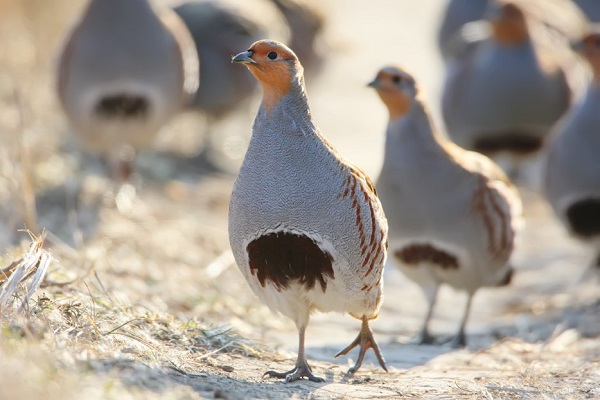 Grey Partridge;
Grey Partridge;
The environmental non-profit organisations natur&ëmwelt and Mouvement Écologique (meco) have jointly lodged a complaint against the Luxembourg government with the European Commission; the groups claim the country's agricultural policy does not do enough to protect nature.
Citing the examples of lowland meadows and grey partridges, both of which are protected at the national and European level, the two organisations demonstrated the "worrying progress of the loss of [protected] habitats and species" in Luxembourg.
The groups argued in a press release: "By refraining from any recourse to measures slowing down this considerable loss, the government accepts it and de facto infringes European Community law which clearly prohibits any deterioration in the conservation status of habitats and species protected in Europe via Directive 92 / 43 / EEC".
On 25 June 2021, negotiations between the European Commission, the European Parliament and the Council of Agriculture Ministers on the Common Agricultural Policy (CAP) for the next seven years came to an end. natur&ëmwelt and meco lamented however that "the biodiversity crisis and the acceleration of structural changes due to the increase in the disappearance of farms [...], we do not see much effort in view of a real agricultural reform which is nevertheless imperative".
The groups criticised the fact that the newly negotiated CAP "continues to rely on generous subsidies through area bonuses and investment aid, instead of equitably rewarding societal services such as protection of the environment and the climate, preservation of biodiversity and efforts to improve animal welfare".
In the meantime, the loss of biodiversity continues unabated in Luxembourg, in particular in cultivated areas located in the open landscape, continued the organisations. They cited the latest report on the habitats and birds directives of 2019 as well as the latest observations published by the Observatory for Climate, Environment and Biodiversity (OCEB) as evidence of this.
Regarding lowland meadows and grey partridges, natur&ëmwelt and meco noted that both the habitat and the bird species have been the subject of several protection programmes and initiatives in recent decades. And yet, both the lowland meadows and the grey partridge population "have considerably decreased in recent decades".
According to the environmental groups, the reasons for this disappearance are "well known and well documented". Citing the European Union's (EU) Article 12 report, monitoring reports and Catalogue of Life (COL) database, they noted that 95% of lowland meadows have been destroyed due to unsuitable agricultural use, whilst the intensification of agriculture, the disappearance of wood from fields and wastelands, the high use of pesticides and fertilisers and the trimming of box hedges have deprived grey partridges of their habitat and food source, making them more vulnerable to predators.
The organisations added that the intensification of agriculture relies largely on state subsidy mechanisms, lamenting that agri-environmental and climate measures and biodiversity bonuses have "not been able [...] to halt this negative trend, because they are not very attractive compared to the high level of subsidies or they are not applied effectively". They argued that the destruction of these habitats and protected species is therefore "not only barely sanctioned or has consequences, it is even encouraged with public funds".
natur&ëmwelt and meco thus called on the Luxembourg government, which they claim is "violating European law and flouting its own responsibilities", to take "coherent and concerted action". This should include the establishment of large-scale protection measures in the new strategic plan of the national agricultural policy aimed at guaranteeing the preservation of habitats and species protected by targeted and adapted aid and premiums in the field of biodiversity as well as the areas of agriculture, the environment and climate.
The organisations also demanded that the accidental and / or intentional destruction of a protected habitat be recorded in a report and sanctioned by the competent authorities in the matter. They added that the penalties imposed in the event of destruction of a protected habitat must at the same time lead to the loss of cross-compliance premiums.
Moreover, for Natura2000 sites, a specific management plan for threatened habitats and species should be established. Specific measures for the qualitative enhancement of protected habitats should be a priority in this regard.
The groups called on the authorities to specifically encourage the restoration of habitats and populations of protected species through specific advice and support from regional biological stations. They also demanded that the strategy for the conservation and restoration of species-rich grasslands in Luxembourg 2020-2030 be transposed.
Finally, the groups demanded that the areas affected by agro-environmental and climate measures and ongoing biodiversity programmes be revealed and that the effectiveness of the respective protection measures be assessed at the end of each rural development programme through specific monitoring and that the respective programmes be adapted if necessary.
natur&ëmwelt and meco concluded:"If the Luxembourg government continues to ignore its failure to comply with European legislation and its responsibility to protect habitats rich in species and endangered species, it not only runs the risk of being inflicted with significant penalties, but also also puts its credibility at stake in the fight against the loss of biodiversity".
These are just some of the facts, figures and observations which form the basis of the complaint lodged with the European Commission.








